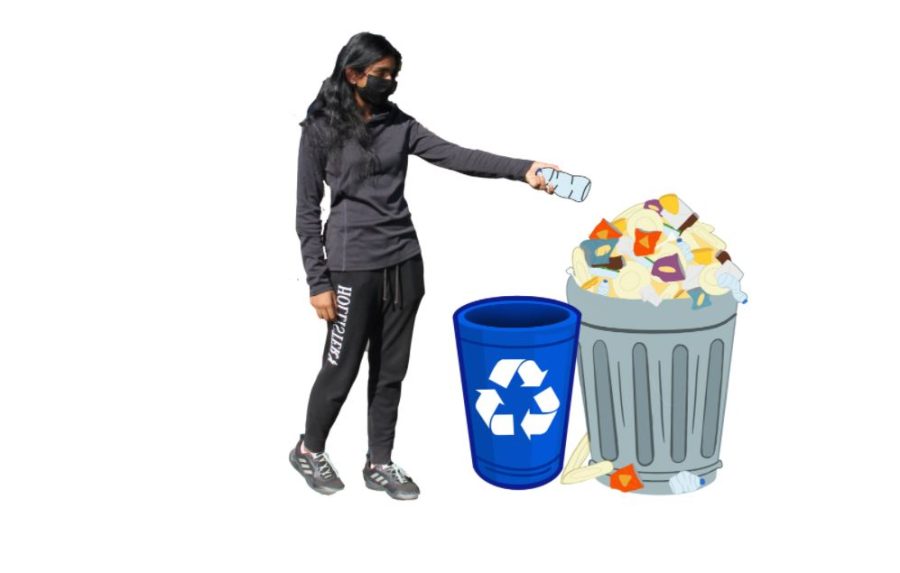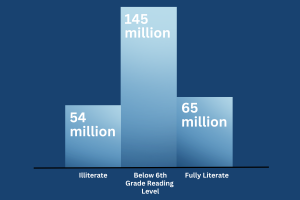Being rubbish at recycling is not responsible
Graphic illustration by Samyukta Sarma and Amishi Chandra
Recycling bins must be properly used to mitigate waste in landfills.
November 9, 2021
As waste increasingly piles up in landfills, the question of whether to recycle or not is surprisingly still inadequately addressed at Lynbrook. While recycling is an effective way to reduce waste and lower environmental impacts, various obstacles such as COVID-19 and a lack of school personnel have put somea recycling programs on hold. However, the future benefits of sustainability outweigh the challenge, and initiating plans that contribute to a greener campus is a good place to start.
Due to alarming climate trends such as increased pollution and global warming, recycling has become less of a suggestion and more of an expectation in recent years. Although Lynbrook currently makes an effort to recycle paper and bottles, students are not educated in what should be recycled, so they often throw recyclable or compostable materials straight into the trash, contributing to pollution and the growth of landfills.
Although recycling initiatives were implemented by the school in the past, they have fallen apart due to declining support and awareness from students and administration. The classroom paper recycling program was initially started by a club, but they lost interest, leaving the task to former club adviser Debbie Schmalz’s teacher assistants. In addition, cans and bottles recycling is managed by the Lynbrook Academic Community Transition program, which helps students with learning and behavioral disabilities become independent and gain vocational skills, but they have faced difficulties during the recycling process.
“The biggest issue we’ve had is people throwing garbage into the recycle bins instead of the trash can,” ACT instructor Dave Herz said. “When we go around and collect bottles or cans from our bins, we have to first weed out all the trash, and sometimes the students just don’t like it.”
COVID-19 halted both initiatives, and reviving recycling efforts has been challenging. Currently, the ACT program only has half of their recycling cans out on campus because students are still learning to work after a year of distance learning. The custodians also agreed to collect recycled paper along with regular trash, but some custodians do not have time to do so properly. Every night, their schedule is packed with not only emptying trash cans but also setting up and cleaning up large events that are held in school buildings.
Therefore, a large part of the success of a recycling program depends on students properly disposing their waste. Because they are often not educated on how to recycle, students repeatedly wish-cycle — the practice of throwing trash into the recycling bin without knowing its recyclability. Students must not contaminate recycling bins with other waste so custodians and ACT students are not forced to either sort through the recycling bin or simply throw the recycling products into the trash.
“A lot of students aren’t aware that you must rinse your containers if they have food, and all items have a label affixed to the container or the side somewhere that states what type of recyclable it is,” facilities manager Edgar Dueñas said.
The solution to reducing Lynbrook’s environmental impact is not easy, but it is within our reach. Lynbrook is capable of adding labeled composting containers and educating students about sustainability, but no actions have been taken by administration. To help the district start implementing green initiatives and climate friendly actions, several students, including Lynbrook Conservation Action Association officers Cindy Chou, Nicholas Kong and Apurva Krishnamurthy, are drafting a climate resolution for the district. An important aspect of the resolution is organic waste collection, which has the potential to help Lynbrook reduce its waste markedly.
“A lot of our waste is organic waste, like paper plates and food waste,” Kong said. “If we implement organic collection with our school’s waste provider, then I feel like that would divert a lot of waste from the landfill.”
Composting organic matter, such as food and soiled paper plates, prevents the release of methane in landfills, and on top of composting, a garden can be added to further aid in sequestering carbon emissions.
Furthermore, increased education about what should be recycled, composted or thrown away is necessary for students to know which items go into which containers. Individuals must make an effort to educate themselves and others about sustainability, and the district should promote education about recycling.
“I think having a homeroom dedicated to teaching people about how to separate different types of waste would help,” Chou said.
Apart from recycling, CAA also recommends making small steps toward sustainability such as carpooling to school, buying from sustainable clothing brands and being aware of which items can be recycled.
In a time of climate crisis, the recycling system at Lynbrook must be addressed and improved upon. Students and staff need to not only increase awareness of their impact on the environment but also strive to implement changes toward a greener campus. However, improvement can only occur if the district is in line with student goals. United as a school and as a district, it is time to take action in the fight against climate change.




























































